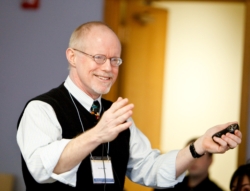Symposium looks at challenges of youth formation
Youth ministers, clergy, religious educators and diocesan leaders gathered March 5 at the Pastoral Center to join in a national conversation on the challenges facing adolescent catechesis in the United States.
The first annual Boston Symposium for Adolescent Catechesis was a first of its kind cross-discipline gathering of those who play a part in the formation of young Catholics in the archdiocese. The effort was jointly sponsored by the archdiocese’s offices for Catholic Schools, Religious Education and the New Evangelization of Youth and Young Adults.
The daylong-conference was led by Sean Reynolds, a professional speaker and director of Youth and Young Adult Ministry for the Archdiocese of Cincinnati. The symposium focused on the challenges presented by the results of a recent study conducted by The National Study of Youth and Religion and suggested fresh new directives for raising young people in the faith. The study, conducted in 2002-2003, showed that among major religious denominations, the Catholic Church was least effective in transmitting the faith to its young people.
In his opening address, Cardinal O’Malley set the tone for the symposium, urging the attendees that now, more than ever, “We must continue to walk with our young people, to accompany them on their journey of faith, in the midst of an increasingly hostile culture.”
“The privatization of religion in today’s climate of new-age individualism is poisonous to the Bible message of community and connectedness in the body of Christ,” said the cardinal.
“We need to promote the distinctiveness of our Catholic identity, our emphasis on community and social teaching -- those things that are uniquely Catholic and through which young people can form a bond to their Church,” he said.
Reynolds’ began his address with a discussion on the findings of the NSYR and the current religious landscape as experienced by adolescents in America. In the first research study of its kind, published in the book, “Soul Searching: The Religious and Spiritual Lives of American Teenagers,” NSYR interviewed 3,400 13 to 17 year olds and their parents over the course of two years. The quantitative findings showed complexity and paradox in the story of contemporary teenage religion.
The research found that when it comes to faith, the vast majority of teens are happy simply to accept the religion in which they were raised, and that in terms of positive life outcomes, highly religious teenagers appear to be doing far better than other teenagers. Yet, contrary to expectation, the research found that most American teenagers are remarkably inarticulate about their faith and are not very religious or spiritual.
Reynolds suggested these seemingly complex findings are in fact very simple when put into the cultural context of the new millennium.
“Today, religion operates in a weak social structural position compared to other activities and organizations that lay claim to U.S. teenagers’ time. Youth ministry is now in competition with athletics, school and extracurricular activities,” said Reynolds.
Additionally, parents have taught religion to their children in a way that emphasizes happiness, not the sacraments or Christian morality, he added
According to Reynolds, Catholic youth are doing poorly for four principle reasons: Catholic upward mobility and mainstream acculturation undermines the vitality of the Church; Catholic school and CCD no longer effectively serve as primary vehicles for education, formation and ministry; youth evangelization and formation are a low institutional priority at the parish and diocesan levels; and, Catholic teenagers significantly reflect the relative religious laxity of their parents.
“Where the challenge of youth ministry used to be getting kids off the streets, or out of ‘sex, drugs, and rock-n-roll,’ now the challenge is just to get them to show up. Youth ministry is now competing with new ‘priorities,’” said Reynolds.
Quoting R. Scott Appleby, a Church historian from the University of Notre Dame, Reynolds said, “No previous generation of American Catholics inherited so little of the content and sensibility of the faith from their parents, as have today’s Catholic youth. The challenge of Catholic education and formation in our media-driven, cyberspace age is no less than this: older Catholics must be restored to, and younger Catholics introduced to, a sense of Catholicism as a comprehensive way of life.”
In between Reynold’s talks, there was opportunity for group discussion. Participants began the day seated by area expertise. Throughout the day, table assignments were changed so that members of different disciplines could interact and discuss the challenges to youth catechesis explained by Reynolds.
Also during the day a group of five local college students addressed the group on their experience of being brought up in the faith.
According to Stephen Colella of the New Evangelization of Youth and Young Adults, “The intention (of the symposium) was to bring all of these educators together to merge the diocese with the parish level -- to sit down and say: ultimately the structures we’ve been relying on to effectively catechize our youth have been ineffective.”
“The NSYR found that our old techniques were not working, so what can we do to really make them work,” he added.



















